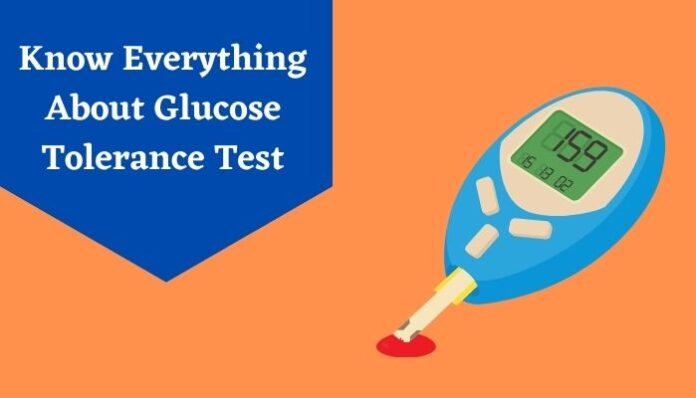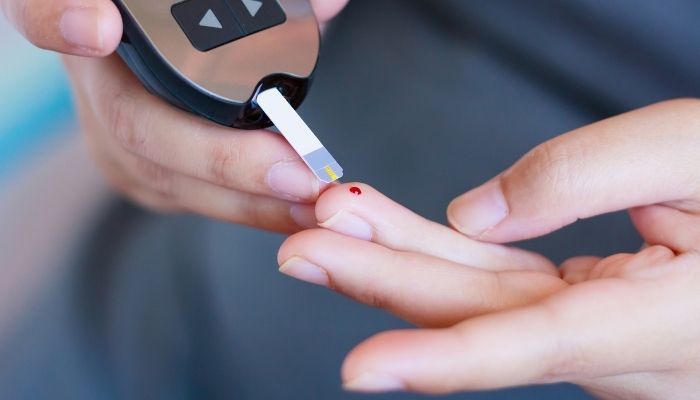The glucose tolerance test is often known as the oral glucose tolerance test that usually measures your body's response to sugar (glucose). This test depicts whether you have type-2 diabetes or you are at risk of having diabetes. A smaller version of this glucose tolerance test pregnancy checks for diabetes during pregnancy or gestational diabetes. This test is also called the oral glucose challenge test.
The prime objective of this test is to identify abnormalities in the way your body gives a response to glucose after a meal.
Please check the price of the glucose tolerance test in Delhi/NCR, your adjacent centers, and other details.
Test Summary
| Is also known as | Glucose Tolerance Test, Oral Glucose Tolerance Test, Oral Glucose Challenge Test |
| Test Type | Blood |
| Glucose tolerance test includes | Your body’s response to sugar (Glucose) |
| Preparation | Eight hours before the test, you can’t eat or drink anything |
| Reporting | Within 24 hours |
| Test Price | The cost of a glucose tolerance test may vary center to center and city to city. You need to check the price online or by visiting the lab. |
| It is also included in | Health Insurance Plans |
| Related Tests | CBC, HbA1C, Hemoglobin A1C, Glycated Hemoglobin, Glycosylated Hemoglobin |
Diabetes Symptoms (Type-2 Diabetes)
- Frequent Urination
- Increased Thirst
- Excessive Hunger
- Fatigue
- Blurred Vision
- Poor Wound Healing
- Weight Gain or Loss
How Do You Prepare for the Test?
Food and Medications
If you are ill or taking medications, inform your doctor as they may impact the test results.Before the Procedure
Don’t eat or drink anything for 8 hours before taking the test.During the Procedure
When you arrive at your nearest hospital or test center, the healthcare team will collect a sample of blood from a vein in your arm. This sample will be used in measuring fasting blood glucose levels.Type 2 Diabetes
If you have tested for type 2 diabetes:- You need to drink 8 ounces (237 milliliters) of a syrupy glucose solution containing 2.6 ounces (75 grams) of sugar
- Your blood glucose test will be measured again after two hours
Gestational Diabetes
The American College of Obstetricians and Gynecologists recommends conducting a one-hour blood glucose challenge test to evaluate gestational diabetes in low-risk pregnant women (between 24 and 28 weeks of pregnancy)Your doctor will recommend the early screening of gestational diabetes if there are some risk factors. These risk factors could be:
- Family history of diabetes
- Obesity
- Any underlying medical condition that is related to diabetes, such as metabolic syndrome or polycystic ovary syndrome
- If your doctor thinks you have a doubtful value on the one-hour test, then, he/she will recommend taking a three-hour glucose tolerance test
For The Three-Hour Test
After your fasting blood sugar test, you need to drink nearly 8 ounces (237 milliliters) of a glucose solution containing 3.5 ounces (100 grams) of sugar. Your blood sugar level will be elevated again in two to three hours after you drink the solution. Then you need to wait in the lab or test center until your blood glucose level is tested again.After the Procedure
You may resume your normal activities once the test is completed.Results
Results of the oral glucose tolerance test are given in milligrams per deciliter (mg/dL) or millimoles per liter (mmol/L).Type 2 Diabetes
If you are tested for type 2 diabetes, two hours after drinking the glucose solution:- A normal blood glucose level is lower than 140 mg/dL (7.8 mmol/L).
- A blood glucose level between 140 and 199 mg/dL (7.8 and 11 mmol/L) is considered impaired glucose tolerance, or prediabetes. If you have tested for prediabetes, you may develop type-2 diabetes in the future.
- A blood glucose level of 200 mg/dL (11.1 mmol/L) or higher may portray diabetes
Gestational Diabetes
If you have tested for gestational diabetes, your doctor will consider the results of each blood glucose test.- If your blood glucose level is higher than 140 mg/dL (7.8 mmol/L) after the one-hour test, your doctor will advise the three-hour test.
- If your blood glucose level is higher than 190 mg/dL (10.6 mmol/L) after the one-hour test, you are having gestational diabetes.
For The Three-Hour Test
- A normal fasting blood glucose level is lower than 95 mg/dL (5.3 mmol/L).
- One hour after drinking the glucose solution, a normal blood glucose level is lower than 180 mg/dL (10 mmol/L).
- Two hours after drinking the glucose solution, a normal blood glucose level is lower than 155 mg/dL (8.6 mmol/L).
- Three hours after drinking the glucose solution, a normal blood glucose level is lower than 140 mg/dL (7.8 mmol/L).
If any of the results show a higher value, then you need to perform the glucose test pregnancy again after 4 weeks. If two or more of the results are higher than normal, you are having gestational diabetes.



